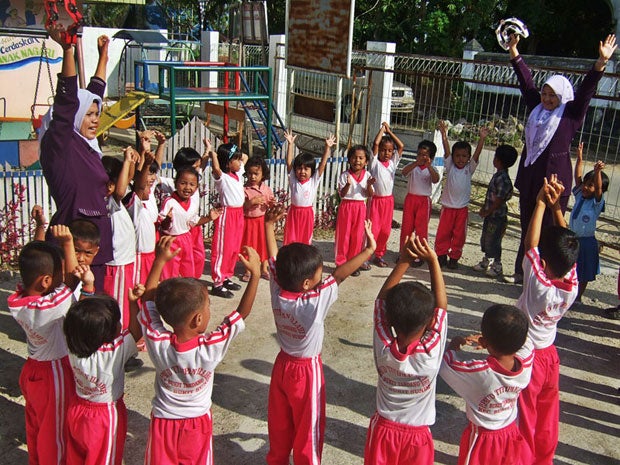
“The first five years have so much to do with how the next 80 turn out,” billionaire philanthropist Bill Gates once said, summing up the importance of early childhood education.
Early education is featured prominently in the World Bank’s Education Strategy 2020, which lays out a ten-year agenda focused on the goal of “learning for all.” With the tagline ‘Invest early, invest smartly, and invest for all,’ the strategy says that an investment in early education will support the development and growth of a nation, particularly for emerging economies such as Indonesia.
During my visits to over 50 districts across the scattered islands that make up this nation, I found many problems about early childhood education and the way young children are being taught. Recently, at a remote village in West Kalimantan’s Ketapang district, I saw children as young as four being drilled in spelling lesson. Some teachers, appearing helpless when their students were more interested to play with their friends, asked me “How do I get children’s attention? Or “How can we make them interested to learn the material?” Others also said they were pressured by the students’ parents to teach basic reading and math, a curriculum for grade one in primary schools.
These teachers are not aware that ‘playing’ stimulates children’s physical, socio-emotional and cognitive development. They don’t know how to blend local knowledge such as popular folklore into student activities and they are not well-equipped to create a welcoming environment that stimulates creativity. Neither do they have the skills to establish good communication with the students’ parents. For children aged 0 to six, learning should be a fun process, and educators must have the skills to guide the process.
To strengthen the skills of educators in villages, many of whom reside in remote locations that require hours of walking or river transport, a new government program has been established. The Smart Generation in Villages program received funding from Australia’s Department of Foreign Affairs and Trade (DFAT) and World Bank support.
Thanks to a $5.4 million grant from DFAT, more than 15,000 early childhood education and community teachers across villages in 25 districts can access a national program to improve their teaching skills. Teachers in rural areas can enroll in district-based training programs lasting up to one year, depending on the resources in their respective villages.
This training is vital because many teachers – particularly in the countryside – are not well equipped with knowledge on early childhood education. The Ministry Education and Culture says that more than 20,000 villages – or about 30% of all villages in this country – don’t have access to early childhood education facilities. There is an urgent need to train these teachers on how to stimulate children’s creativity. This simply cannot wait.
The Smart Generation in Villages program was not established in a vacuum; it builds on existing initiatives. Specifically, the program was born out of three existing programs: the Smart and Healthy Generation program under the Ministry of Villages, Disadvantaged Regions and Transmigration; the Ministry of Education and Culture’s Early Education Program; and a program to improve the quality of teachers and education professionals.
The training is rigorous. There are four phases that teachers have to complete. First, they must attend 48 hours of intensive basic training on early education, offered by the Ministry of Education and Culture. Second, they must complete 200 hours of independent assignment in their respective villages. Third, they will receive support to attend the inter-village Early Childhood Education Teacher Forum based in the districts’ capital. Fourth, each teacher will be visited by the district coach to receive feedback on their performance.
I’m heartened to see the growing attention and interest of the Indonesian government on early childhood education. Our research has shown that children who receive excellent early childhood education tend to be more successful as they grow older and are more competent socially and emotionally. With this new program, the government is making a sustainable investment on the country’s future workforce. This will help Indonesia transform to a knowledge and service-based economy that can compete globally.
Some of us may not live beyond 80. But as Mr Gates implied, the intelligence and creativity of our future generations depend on how we support early education now.


Join the Conversation